Ditapis dengan
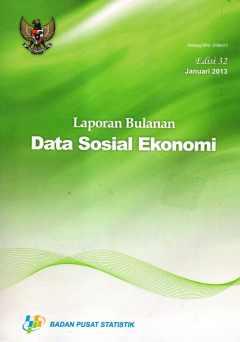
Laporan Bulanan Data Sosial Ekonomi Edisi 32 Januari 2013
Laporan Bulanan Data Sosial Ekonomi Edisi 32 Januari 2013 adalah sebuah publikasi periodik yang menyajikan analisis dan informasi terkini mengenai kondisi sosial dan ekonomi pada bulan Januari 2013. Laporan ini membahas berbagai aspek penting seperti tingkat pengangguran, inflasi, pertumbuhan ekonomi, kemiskinan, dan isu-isu sosial lainnya yang relevan pada waktu itu.
- Edisi
- Edisi 32 Januari 2013
- ISBN/ISSN
- -
- Deskripsi Fisik
- xii + 108 halaman
- Judul Seri
- Textbook
- No. Panggil
- 330.021 BPS l
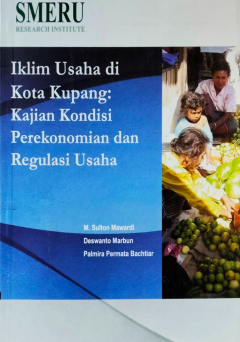
Iklim Usaha di Kota Kupang: Kajian Kondisi Perekonomian dan Regulasi Usaha
Laporan “Iklim Usaha di Kota Kupang: Kajian Kondisi Perekonomian dan Regulasi Usaha” ini merupakan upaya untuk memetakan dan menganalisis regulasi daerah yang terkait dunia usaha di Kota Kupang. Secara tekstual, kajian ini menggunakan aspek hukum (yuridis), substansi, dan prinsip sebagai acuan dalam menganalisis kebermasalahan regulasi daerah serta potensi dampaknya terhadap dunia usaha. Se…
- Edisi
- 1
- ISBN/ISSN
- 9789793872865
- Deskripsi Fisik
- xii, 135 halaman ; 22 cm
- Judul Seri
- Textbook
- No. Panggil
- 338.642 SUL i
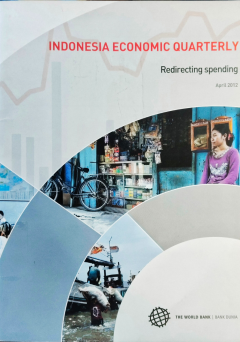
INDONESIA ECONOMIC QUARTERLY April 2012 ; Redirecting spending
International developments continue to shape Indonesia’s near-term economic outlook, but the focus of attention has shifted. In late 2011 the primary concern was the deteriorating and uncertain outlook for the global economy and financial markets. The recent sharp rise in global oil prices has added a new dimension to the situation, raising the projected cost of Indonesia’s fuel subsidies.
- Edisi
- April 2012
- ISBN/ISSN
- -
- Deskripsi Fisik
- xii, 52 halaman ; 28 cm
- Judul Seri
- Textbook
- No. Panggil
- 330.05 THE i
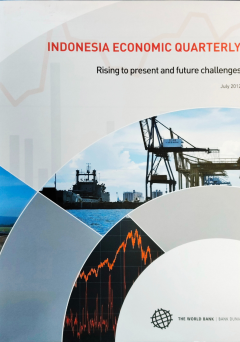
INDONESIA ECONOMIC QUARTERLY July 2012 ; Rising to present and future challe…
However, to date Indonesia’s growth performance has remained solid. GDP growth in the first quarter of 2012 was 6.3 percent year-on-year, down slightly from 6.5 percent in 2011 as a whole. Consumption held up well in the first quarter of 2012, investment growth came down while net exports made a negative contribution to growth.
- Edisi
- Juli 2012
- ISBN/ISSN
- -
- Deskripsi Fisik
- xi, 45 halaman ; 28 cm
- Judul Seri
- Textbook
- No. Panggil
- 330.05 THE i
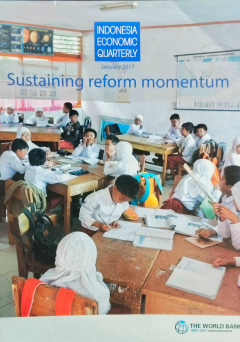
INDONESIA ECONOMIC QUARTERLY January 2017 ; Sustaining reform momentum
Indonesia was among the top 10 improvers globally in this year’s Doing Business report. Indonesia’s ranking improved from 106 in 2016 to 91 in 2017, thanks in particular to a record seven reforms that eased starting a business, getting electricity paying taxes, registering property, getting credit, enforcing contracts and trading across borders.
- Edisi
- Januari 2017
- ISBN/ISSN
- -
- Deskripsi Fisik
- iv, 40 halaman ; 28 cm
- Judul Seri
- Textbook
- No. Panggil
- 330.05 THE i
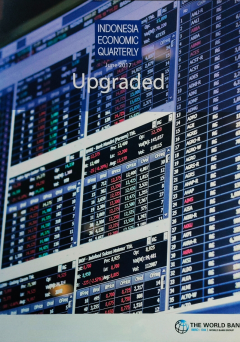
INDONESIA ECONOMIC QUARTERLY June 2017 ; Upgraded
Electricity price hikes in 2017 for 900 VA users have contributed to an increase in inflation to 3.9 percent for the first five months of the year. The effects of higher energy costs have been partially offset by lower food inflation. This year’s inflation is expected to average 4.3 percent, remaining within Bank Indonesia’s inflation target band.
- Edisi
- Juni 2017
- ISBN/ISSN
- -
- Deskripsi Fisik
- iv, 52 halaman ; 28 cm
- Judul Seri
- Textbook
- No. Panggil
- 330.05 THE i
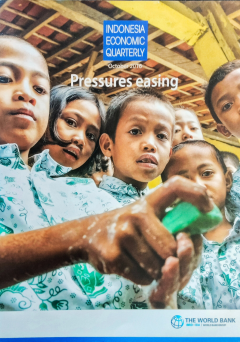
INDONESIA ECONOMIC QUARTERLY October 2016 ; Pressures easing
Tourism is a promising sector to boost the country’s growth. Growth in this sector could help unlock private investment, create jobs, boost exports and guide infrastructure investments. According to the World Travel and Tourism Council, every $1 million in travel and tourism spending supports around 200 jobs and $1.7 million in GDP for Indonesia.
- Edisi
- Oktober 2016
- ISBN/ISSN
- -
- Deskripsi Fisik
- v, 59 halaman ; 28 cm
- Judul Seri
- Textbook
- No. Panggil
- 330.05 THE i
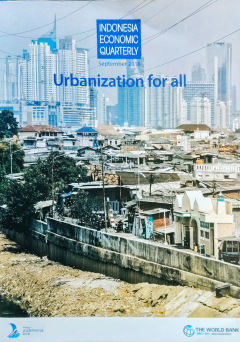
INDONESIA ECONOMIC QUARTERLY September 2018 ; Urbanization for all
Indonesia’s real GDP growth rose to 5.3 percent as domestic demand strengthened. Private and government consumption accelerated thanks to higher subsidy and personnel spending, as well as a pick-up in credit growth, stable inflation and strong job markets.
- Edisi
- September 2018
- ISBN/ISSN
- -
- Deskripsi Fisik
- v, 68 halaman ; 28 cm
- Judul Seri
- Textbook
- No. Panggil
- 330.05 THE i
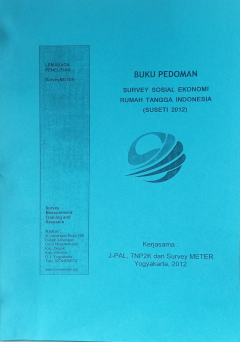
Buku Pedoman Survey Sosial Ekonomi Rumah Tangga Indonesia (SUSETI 2012)
Sebagai pelaku ekonomi, rumah tangga berperan dalam berbagai aktivitas ekonomi mulai dari produksi, konsumsi, dan investasi. Dalam aktivitas produksi, rumah tangga menyediakan faktor produksi tenaga kerja dan modal. Seseorang yang bekerja akan mendapatkan pendapatan yang tercipta dari nilai tambah produksi berupa kompensasi tenaga kerja atau upah/gaji.
- Edisi
- 2012
- ISBN/ISSN
- -
- Deskripsi Fisik
- ii, 84 halaman
- Judul Seri
- Textbook
- No. Panggil
- 330.9598 TNP b
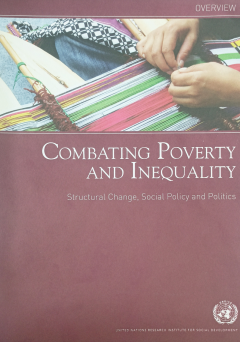
Combating Poverty and Inequality
Poverty and inequality are pervasive global issues that undermine social stability, economic growth, and individual well-being. Social protection systems, encompassing social insurance, social assistance, and labor market programs, are pivotal in addressing these challenges. This paper explores the multifaceted role of social protection in combating poverty and inequality.
- Edisi
- -
- ISBN/ISSN
- 978-92-9085-077-9
- Deskripsi Fisik
- iv + 24 halaman
- Judul Seri
- Textbook
- No. Panggil
- 362.5 UNR c
 Karya Umum
Karya Umum  Filsafat
Filsafat  Agama
Agama  Ilmu-ilmu Sosial
Ilmu-ilmu Sosial  Bahasa
Bahasa  Ilmu-ilmu Murni
Ilmu-ilmu Murni  Ilmu-ilmu Terapan
Ilmu-ilmu Terapan  Kesenian, Hiburan, dan Olahraga
Kesenian, Hiburan, dan Olahraga  Kesusastraan
Kesusastraan  Geografi dan Sejarah
Geografi dan Sejarah